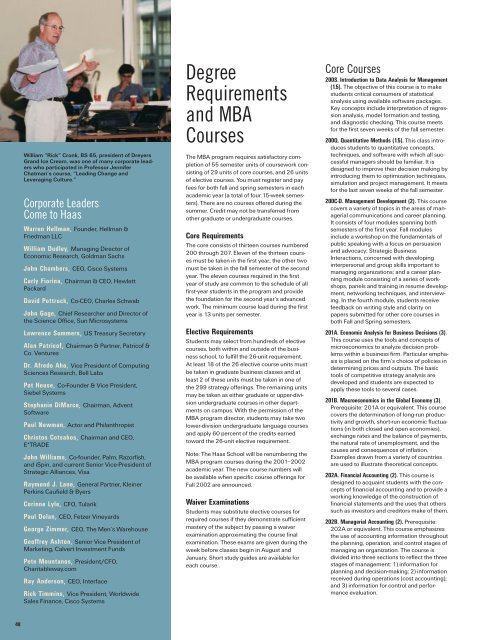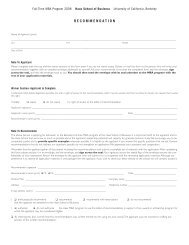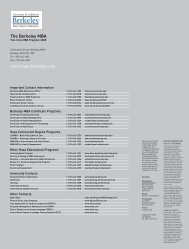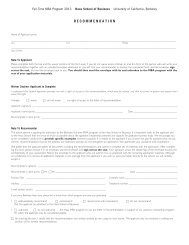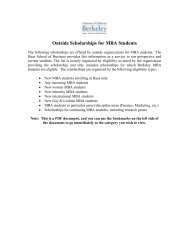TheBerkeleyMBA - Full-time MBA Program, Haas School of ...
TheBerkeleyMBA - Full-time MBA Program, Haas School of ...
TheBerkeleyMBA - Full-time MBA Program, Haas School of ...
You also want an ePaper? Increase the reach of your titles
YUMPU automatically turns print PDFs into web optimized ePapers that Google loves.
William “Rick” Cronk, BS 65, president <strong>of</strong> Dreyers<br />
Grand Ice Cream, was one <strong>of</strong> many corporate leaders<br />
who participated in Pr<strong>of</strong>essor Jennifer<br />
Chatman’s course, “Leading Change and<br />
Leveraging Culture.”<br />
Corporate Leaders<br />
Come to <strong>Haas</strong><br />
Warren Hellman, Founder, Hellman &<br />
Friedman LLC<br />
William Dudley, Managing Director <strong>of</strong><br />
Economic Research, Goldman Sachs<br />
John Chambers, CEO, Cisco Systems<br />
Carly Fiorina, Chairman & CEO, Hewlett<br />
Packard<br />
David Pottruck, Co-CEO, Charles Schwab<br />
John Gage, Chief Researcher and Director <strong>of</strong><br />
the Science Office, Sun Microsystems<br />
Lawrence Summers, US Treasury Secretary<br />
Alan Patric<strong>of</strong>, Chairman & Partner, Patric<strong>of</strong> &<br />
Co. Ventures<br />
Dr. Afredo Aho, Vice President <strong>of</strong> Computing<br />
Sciences Research, Bell Labs<br />
Pat House, Co-Founder & Vice President,<br />
Siebel Systems<br />
Stephanie DiMarco, Chairman, Advent<br />
S<strong>of</strong>tware<br />
Paul Newman, Actor and Philanthropist<br />
Christos Cotsakos, Chairman and CEO,<br />
E*TRADE<br />
John Williams, Co-founder, Palm, Razorfish,<br />
and iSpin, and current Senior Vice-President <strong>of</strong><br />
Strategic Alliances, Visa<br />
Raymond J. Lane, General Partner, Kleiner<br />
Perkins Caufield & Byers<br />
Corinne Lyle, CFO, Tularik<br />
Paul Dolan, CEO, Fetzer Vineyards<br />
George Zimmer, CEO, The Men’s Warehouse<br />
Ge<strong>of</strong>frey Ashton, Senior Vice President <strong>of</strong><br />
Marketing, Calvert Investment Funds<br />
Pete Mountanos, President/CFO,<br />
Charitableway.com<br />
Ray Anderson, CEO, Interface<br />
Rick Timmins, Vice President, Worldwide<br />
Sales Finance, Cisco Systems<br />
Degree<br />
Requirements<br />
and <strong>MBA</strong><br />
Courses<br />
The <strong>MBA</strong> program requires satisfactory completion<br />
<strong>of</strong> 55 semester units <strong>of</strong> coursework consisting<br />
<strong>of</strong> 29 units <strong>of</strong> core courses, and 26 units<br />
<strong>of</strong> elective courses. You must register and pay<br />
fees for both fall and spring semesters in each<br />
academic year (a total <strong>of</strong> four 15-week semesters).<br />
There are no courses <strong>of</strong>fered during the<br />
summer. Credit may not be transferred from<br />
other graduate or undergraduate courses.<br />
Core Requirements<br />
The core consists <strong>of</strong> thirteen courses numbered<br />
200 through 207. Eleven <strong>of</strong> the thirteen courses<br />
must be taken in the first year; the other two<br />
must be taken in the fall semester <strong>of</strong> the second<br />
year. The eleven courses required in the first<br />
year <strong>of</strong> study are common to the schedule <strong>of</strong> all<br />
first-year students in the program and provide<br />
the foundation for the second year’s advanced<br />
work. The minimum course load during the first<br />
year is 13 units per semester.<br />
Elective Requirements<br />
Students may select from hundreds <strong>of</strong> elective<br />
courses, both within and outside <strong>of</strong> the business<br />
school, to fulfill the 26-unit requirement.<br />
At least 18 <strong>of</strong> the 26 elective course units must<br />
be taken in graduate business classes and at<br />
least 2 <strong>of</strong> these units must be taken in one <strong>of</strong><br />
the 299 strategy <strong>of</strong>ferings. The remaining units<br />
may be taken as either graduate or upper-division<br />
undergraduate courses in other departments<br />
on campus. With the permission <strong>of</strong> the<br />
<strong>MBA</strong> program director, students may take two<br />
lower-division undergraduate language courses<br />
and apply 60 percent <strong>of</strong> the credits earned<br />
toward the 26-unit elective requirement.<br />
Note: The <strong>Haas</strong> <strong>School</strong> will be renumbering the<br />
<strong>MBA</strong> program courses during the 2001–2002<br />
academic year. The new course numbers will<br />
be available when specific course <strong>of</strong>ferings for<br />
Fall 2002 are announced.<br />
Waiver Examinations<br />
Students may substitute elective courses for<br />
required courses if they demonstrate sufficient<br />
mastery <strong>of</strong> the subject by passing a waiver<br />
examination approximating the course final<br />
examination. These exams are given during the<br />
week before classes begin in August and<br />
January. Short study guides are available for<br />
each course..<br />
Core Courses<br />
200S. Introduction to Data Analysis for Management<br />
(1.5). The objective <strong>of</strong> this course is to make<br />
students critical consumers <strong>of</strong> statistical<br />
analysis using available s<strong>of</strong>tware packages.<br />
Key concepts include interpretation <strong>of</strong> regression<br />
analysis, model formation and testing,<br />
and diagnostic checking. This course meets<br />
for the first seven weeks <strong>of</strong> the fall semester.<br />
200Q. Quantitative Methods (1.5). This class introduces<br />
students to quantitative concepts,<br />
techniques, and s<strong>of</strong>tware with which all successful<br />
managers should be familiar. It is<br />
designed to improve their decision making by<br />
introducing them to optimization techniques,<br />
simulation and project management. It meets<br />
for the last seven weeks <strong>of</strong> the fall semester.<br />
200C-D. Management Development (2). This course<br />
covers a variety <strong>of</strong> topics in the areas <strong>of</strong> managerial<br />
communications and career planning.<br />
It consists <strong>of</strong> four modules spanning both<br />
semesters <strong>of</strong> the first year. Fall modules<br />
include a workshop on the fundamentals <strong>of</strong><br />
public speaking with a focus on persuasion<br />
and advocacy; Strategic Business<br />
Interactions, concerned with developing<br />
interpersonal and group skills important to<br />
managing organizations; and a career planning<br />
module consisting <strong>of</strong> a series <strong>of</strong> workshops,<br />
panels and training in resume development,<br />
networking techniques, and interviewing.<br />
In the fourth module, students receive<br />
feedback on writing style and clarity on<br />
papers submitted for other core courses in<br />
both Fall and Spring semesters.<br />
201A. Economic Analysis for Business Decisions (3).<br />
This course uses the tools and concepts <strong>of</strong><br />
microeconomics to analyze decision problems<br />
within a business firm. Particular emphasis<br />
is placed on the firm’s choice <strong>of</strong> policies in<br />
determining prices and outputs. The basic<br />
tools <strong>of</strong> competitive strategy analysis are<br />
developed and students are expected to<br />
apply these tools to several cases.<br />
201B. Macroeconomics in the Global Economy (3).<br />
Prerequisite: 201A or equivalent. This course<br />
covers the determination <strong>of</strong> long-run productivity<br />
and growth, short-run economic fluctuations<br />
(in both closed and open economies),<br />
exchange rates and the balance <strong>of</strong> payments,<br />
the natural rate <strong>of</strong> unemployment, and the<br />
causes and consequences <strong>of</strong> inflation.<br />
Examples drawn from a variety <strong>of</strong> countries<br />
are used to illustrate theoretical concepts.<br />
202A. Financial Accounting (2). This course is<br />
designed to acquaint students with the concepts<br />
<strong>of</strong> financial accounting and to provide a<br />
working knowledge <strong>of</strong> the construction <strong>of</strong><br />
financial statements and the uses that others<br />
such as investors and creditors make <strong>of</strong> them.<br />
202B. Managerial Accounting (2). Prerequisite:<br />
202A or equivalent. This course emphasizes<br />
the use <strong>of</strong> accounting information throughout<br />
the planning, operation, and control stages <strong>of</strong><br />
managing an organization. The course is<br />
divided into three sections to reflect the three<br />
stages <strong>of</strong> management: 1) information for<br />
planning and decision-making; 2) information<br />
received during operations (cost accounting);<br />
and 3) information for control and performance<br />
evaluation.<br />
48


